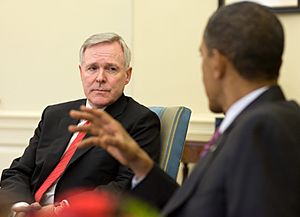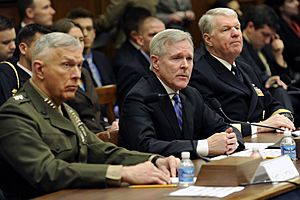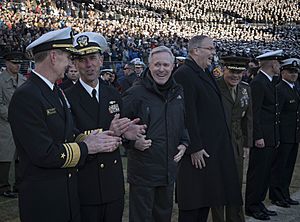Ray Mabus facts for kids
Quick facts for kids
Ray Mabus
|
|
|---|---|
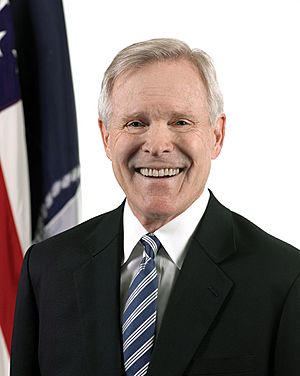
Official portrait, 2014
|
|
| 75th United States Secretary of the Navy | |
| In office May 19, 2009 – January 20, 2017 |
|
| President | Barack Obama |
| Deputy | Robert O. Work Robert C. Martinage (acting) Thomas W. Hicks (acting) Janine A. Davidson |
| Preceded by | Donald C. Winter |
| Succeeded by | Richard V. Spencer |
| United States Ambassador to Saudi Arabia | |
| In office July 5, 1994 – April 25, 1996 |
|
| President | Bill Clinton |
| Preceded by | John Frank Bookout Jr. |
| Succeeded by | Wyche Fowler |
| 60th Governor of Mississippi | |
| In office January 12, 1988 – January 14, 1992 |
|
| Lieutenant | Brad Dye |
| Preceded by | William Allain |
| Succeeded by | Kirk Fordice |
| 37th Auditor of Mississippi | |
| In office January 5, 1984 – January 7, 1988 |
|
| Governor | William Allain |
| Preceded by | Hamp King |
| Succeeded by | Pete Johnson |
| Personal details | |
| Born |
Raymond Edwin Mabus Jr.
October 11, 1948 Ackerman, Mississippi, U.S. |
| Political party | Democratic |
| Spouses |
Julie Hines
(m. 1987; div. 2000)Lynne Horecky
(m. 2007) |
| Children | 3 |
| Relatives | Brandon Presley (cousin-in-law) |
| Education | University of Mississippi (BA) Johns Hopkins University (MA) Harvard University (JD) |
| Military service | |
| Allegiance | United States |
| Branch/service | United States Navy |
| Years of service | 1970–1972 |
| Rank | Lieutenant (junior grade) |
Raymond Edwin Mabus Jr. (born October 11, 1948) is an American politician and lawyer. He is a member of the Democratic Party. He served as the 75th United States Secretary of the Navy from 2009 to 2017.
Before that, Mabus was the State auditor of Mississippi from 1984 to 1988. He was also the 60th Governor of Mississippi from 1988 to 1992. Later, he served as the United States ambassador to Saudi Arabia from 1994 to 1996.
Contents
Early Life and Education
Ray Mabus was born on October 11, 1948, in Ackerman, Mississippi. He was the only child of Raymond Mabus Sr., a timber farmer, and Lucille Mabus, a teacher.
He graduated from Ackerman High School in 1966 as the top student. He then graduated with high honors from the University of Mississippi. There, he studied English and political science. He earned a master's degree in political science from Johns Hopkins University. He also earned a law degree with high honors from Harvard Law School.
Before law school, he served two years in the United States Navy from 1970 to 1972. He was a surface warfare officer and reached the rank of lieutenant junior grade. He worked as a law clerk and a legal counsel for a committee in the U.S. House of Representatives.
Early Political Career
Mabus started his political work by volunteering for William F. Winter's campaign in 1967. After Winter became governor in 1979, Mabus returned to Mississippi. He worked as the governor's legal counsel in 1980.
During this time, Governor Winter and his team worked to improve the state's public education system. Mabus helped explain the new education plan to people across the state. He also helped create a law that made government records more open to the public. He left this job in 1983.
Mississippi State Auditor
Becoming State Auditor
In 1982, Mabus found out that government audits in Hinds County, Mississippi were very old. An audit checks how government money is spent. He realized the State Auditor's office had the power to investigate almost all government agencies. He thought this office could fight corruption.
He decided to run for State Auditor in 1983. Mabus said the audit department was years behind on its work. He won the election and became State Auditor on January 5, 1984.
Improving the Auditor's Office
When Mabus took office, the audit department was very messy. Many audits were years behind. He got permission to hire private accounting firms to help catch up. They finished the backlog in two years.
He also made new rules for county governments. They had to keep their accounting records up-to-date. He increased the cost for auditing services to encourage counties to manage their own records better. He also started a special division to investigate problems.
Mabus warned county leaders that he would strictly enforce financial laws. He created a hotline for people to report misconduct. His office audited all 82 counties in Mississippi. This helped recover $1.7 million in misused funds. His actions made some county leaders upset.
Mabus also worked with the Federal Bureau of Investigation (FBI) on a corruption investigation called "Operation Pretense." This investigation led to many public officials being charged. Mabus asked the state legislature to change how counties were run to prevent future corruption. He was replaced as State Auditor by Pete Johnson in 1988.
Governor of Mississippi
1987 Election for Governor
Mabus started planning to run for governor in 1985. He officially announced his candidacy in 1987. The current governor, William Allain, did not run again. Mabus won the Democratic primary election.
In the general election, Mabus ran against Republican Jack Reed. Mabus used the slogan "Mississippi will never be last again." He promised to raise teacher salaries. He won the election with 53.4 percent of the vote. He became the 60th Governor of Mississippi on January 12, 1988. At 39, he was the youngest governor in the country.
Working as Governor
Mabus brought many new people into his government. He appointed the first black members to the State Tax Commission. He also appointed the first woman to lead the Department of Public Safety.
County Government Changes
Early in his term, Mabus wanted to change how counties were governed. He proposed a law that would require counties to hire professional administrators. This would help manage money and purchases better. The legislature passed a law allowing counties to vote on changing their government system.
In November, 46 of the 82 counties voted to adopt the new system. Mabus believed this would make county governments more efficient and less prone to corruption.
Education Improvements
Mabus focused on improving public education in 1990. He proposed a plan called B.E.S.T. (Better Education for Success Tomorrow). This plan included new programs for adults to learn to read and write. It also aimed to help students who dropped out of high school. The plan suggested creating health clinics in schools. It also wanted to reward good schools and help struggling ones.
Mabus wanted to fund these changes without raising sales or income taxes. He suggested a state lottery, but the state constitution banned lotteries. Most of his B.E.S.T. plan passed, but it lacked funding. He continued to push for funding without success.
Despite funding challenges, Mabus gave teachers the largest pay raise in the nation at the time. Fortune Magazine named him one of the ten "best education governors."
1991 Election for Governor
Mabus was the first Mississippi governor in the 20th century to run for reelection. In the 1991 Democratic primary, he won against Wayne Dowdy.
In the general election, Mabus faced Republican Kirk Fordice. Fordice criticized Mabus for spending too much and called him a "liberal." Mabus focused on supporting public education. Fordice won the election with 50.8 percent of the vote. This was the first time a Republican won a Mississippi gubernatorial race since 1874. Mabus was succeeded by Fordice on January 14, 1992.
Ambassador to Saudi Arabia and Later Work
After being governor, President Bill Clinton appointed Mabus as the United States Ambassador to Saudi Arabia. He served from 1994 to 1996. During his time there, five Americans were killed in a bombing. Before he left, the Saudi Arabian government gave him the Order of King Abdulaziz award.
After returning to Mississippi, Mabus worked as a lawyer. In 2000, he took a leadership role at Foamex International, a manufacturing company. He left that position in 2007.
In 2008, Mabus supported Barack Obama for president. On March 27, 2009, President Obama nominated Mabus to be the United States Secretary of the Navy. He was sworn in on May 19, 2009. He served in this role until January 20, 2017.
The Great Green Fleet
Soon after becoming Secretary, Mabus announced a goal for the Navy. He wanted half of the Navy's power to come from non-petroleum sources by 2020. This was part of the "Great Green Fleet" plan. The idea was to use alternative energy to reduce the Navy's reliance on foreign oil.
The Navy experimented with biofuels. At first, these fuels were very expensive. However, by 2016, the Navy was using a beef-fat fuel blend that cost less. A destroyer even operated on a biofuel blend that was cheaper than regular fuel.
As Navy Secretary, Mabus was responsible for naming ships. He named some ships after important people. For example, he named the USS John P. Murtha (LPD-26) after a congressman. He also named the auxiliary ship USNS Cesar Chavez (T-AKE-14) after civil rights activist Cesar Chavez. Another ship, the USS Gabrielle Giffords (LCS-10), was named after former Congresswoman Gabby Giffords.
In 2016, he announced that a new class of auxiliary ships would be named after civil rights leaders. The first ship in this class was named USNS John Lewis (T-AO-205) after Congressman John Lewis. He also named a ship, T-AO-206, after a civil rights icon.
Gulf Coast Recovery Efforts
In 2010, President Obama asked Mabus to create a plan to help the Gulf Coast. This was after the Deepwater Horizon oil spill. Mabus introduced a recovery plan in September 2010.
Based on his ideas, Congress passed the RESTORE Act. This law set aside over $5 billion to help restore the coast.
Personnel Changes
Mabus focused on making the Navy more diverse. He supported policies that allowed gay service members to serve openly. In 2011, women were allowed to join the submarine fleet.
He also worked to improve education for Navy personnel. He created new Reserve Officers' Training Corps (ROTC) programs at universities. He also started a program for junior officers to work at large companies. In 2015, he expanded maternity leave for Navy personnel to 18 weeks. This was later adjusted to 12 weeks across all armed forces.
In 2015, a study on women in the Marine Corps was released. Mabus disagreed with some of its findings. He ordered the Marine Corps to make all training co-ed and job titles gender neutral. However, he later agreed to keep boot camp separated by gender.
Leaving Office
Mabus stepped down as Secretary of the Navy on January 20, 2017. This was when President Donald Trump took office. Mabus was one of the few national security officials to serve for President Obama's entire time in office. He was the longest-serving Secretary of the Navy since 1921. He said that leading the Navy Department was the greatest honor of his life.
Awards and Honors
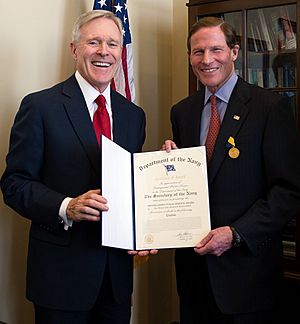
Ray Mabus has received many awards. These include the U.S. Department of Defense Distinguished Public Service Award. He also received the U.S. Army's Distinguished Civilian Service Award. He was given the Martin Luther King Jr. Social Responsibility Award.
He also received the National Wildlife Federation Conservation Achievement Award. The Kingdom of Saudi Arabia gave him the Order of King Abdulaziz award. In 2017, the Mississippi Center for Justice gave him the Champion of Justice award. In 2019, his hometown of Ackerman honored him with a historic marker.
Mabus is involved in many community activities, especially those focused on education. After Hurricane Katrina, he started the Help and Hope Foundation. This foundation helps children affected by the storm.
Personal Life and Hobbies
Mabus married Julie Hines in 1987. They had two daughters together. They divorced in 2000. He married Lynne Horecky in 2007.
Mabus is a fan of the Boston Red Sox baseball team. During his time as Navy Secretary, he threw the first pitch at all 30 major league baseball parks in the United States. He is believed to be the only person to have done this.
Acting Roles
Ray Mabus has made cameo appearances in TV shows and movies. In 2009 and 2014, he appeared on the TV drama NCIS as an NCIS Agent named "Ray." In 2012, he was in the movie Battleship as the commanding officer of the USS Ronald Reagan. He also appeared as himself in an episode of the TV series The Last Ship.
 | Toni Morrison |
 | Barack Obama |
 | Martin Luther King Jr. |
 | Ralph Bunche |


